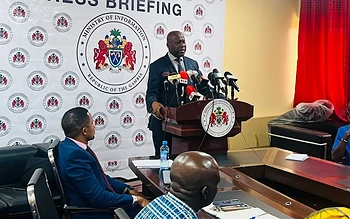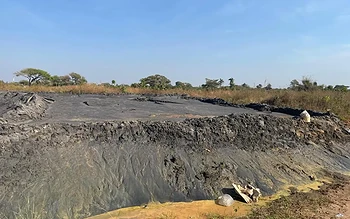
The National Assembly of The Gambia on Thursday, 15th May 2025, selected a seven-member special committee tasked to investigate the controversial sale of former president Yahya Jammeh’s assets.
The lawmakers held an extraordinary session on Wednesday and Thursday following The Republic exposé on the sales of the former leader’s assets which sparked nationwide outrage and protests demanding full disclosure of details regarding the sales.
President Adama Barrow addressed the nation last night claiming he learned some details about the sales for the first time after the Ministry of Justice released the list over the weekend.
After two days of debating, members of the National Assembly selected the following representatives to comprise the special committee:
- Hon. Abdoulie Ceesay, NAM for Old Yundum, chair
- Hon. Madi Ceesay, NAM for Serekunda West, vice chair
- Hon. Suwaibou Touray, NAM for Wuli East
- Hon. Omar Jammeh, NAM for Jangjangbureh
- Hon. Kebba Lang Fofana, Nominated
- Hon. Sheriff Sarr, NAM for Jeshwang
- Hon. Alhagie Mbowe, NAM for Upper Saloum
The National Assembly has mandated the special committee to “conduct a full, impartial and independent inquiry, and to report its findings and recommendations to this Assembly within a period not exceeding one hundred and twenty (120) days from the date of its first sitting.”
The special committee is equally empowered to summon any person, institution, or entity it deems necessary to assist in the discharge of its mandate.
TOR of the committee
The Committee shall be guided by, but not limited to the following terms:
(1) Inquire into the list of assets identified by the Commission and determine which assets were sold, transferred, or otherwise disposed of;
(2) Investigate the legal and administrative processes used in the disposal of the said assets, including the authority under which they were sold;
(3) Assess whether all actions taken were in accordance with the laws of The Gambia, particularly laws and policy relating to procurement, anti- corruption, and public finance.
(4) Examine the valuation, pricing, and procurement methods used to determine asset value and identify any discrepancies or undervaluation.
(5) Investigate whether the valuations and sales were transparent, competitive, and in the public interest.
(6) Identify and profile purchasers of the assets, including individuals and corporate entities, assessing whether proper procedures were followed and determine whether any conflicts of interest, abuse of office, or procedural irregularities occurred.
(7) Evaluate the management and accounting of proceeds generated from the asset disposals and determine whether such funds were properly deposited in public accounts, including the national treasury and any special accounts.
(8) Wherever discrepancies of a criminal or fraudulent nature are discovered during the inquiry, immediately cause a report of those findings to be submitted to the Inspector General of Police for further necessary action.
(9) Recommend appropriate remedial and preventive measures, including legal or administrative redress, reforms in policy and law, as well as appropriate institutional reform.
Aftermath of The Republic’s exposé
On 30th April, 2025, The Republic published its third investigative report into the controversial sale of former president Yahya Jammeh’s assets.
The report sparked widespread condemnation both in and outside The Gambia with persistent calls for the Barrow government to release the full details on the sale of Jammeh’s assets.
Here is a timeline of events in the aftermath of the investigative report:
Barely a week after the publication on 6th May 2025, a group of young people, dubbed Gambians Against Looted Assets, wrote to the Inspector General of Police seeking a permit to embark on a protest which aimed to demand the government release full details of the sales, including identifies of buyers and the prices.
However the next day, on 7th May, the police responded to the letter denying them a permit to protest. This enraged the group who vowed to take to the streets regardless.
On the same day, the Majority Leader at the National Assembly, Billay G Tunkara, wrote on Facebook that he has submitted a formal notice of intention to the Clerk to introduce a motion to consider establishing a Special Select Committee to impartially conduct a full inquiry into the sales.
As promised, on 8th May, a sizable number of youths converged at the Arch in Bajul but were quickly rounded up by the police before even starting their procession. This sparked more protests and more arrests, with at least 27 members of the group detained in different locations by Friday 9th May.
Simultaneous protests were held in Banjul, Westfield and Brikama as the youths persisted against police crackdown.
The Association of Non-Governmental Organisation, the umbrella body of all civil society organisations in the country, on 8th May described the allegations in the report as a threat to public trust in the government’s commitment to justice and transparency.
On 9th May, EFSCRJ joined calls for the immediate resignation of Emmanuel Joof, Bai Emil Touray and Baboucarr Cham. The GPU had earlier condemned MCG and NHRC leaders for pressuring The Republic editor-in-chief to exonerate Tambadou. Both institutions equally released statements defending themselves.
That same evening, to the surprise of many, the Gambia government released details of the sales through the Ministry of Justice.
On 10th May, as the country rejoiced in the release of both the list and the detainees, the National Assembly announced it will convene for an extraordinary session on Wednesday and Thursday to consider the motion to establish a special committee to look into Jammeh’s assets and disposal.
Political parties such as UDP, APRC, and APP-Sobeyaa have all issued statements on the report while anti-corruption watchdog Gambia Participates welcomed parliament’s efforts to investigate the sales.


